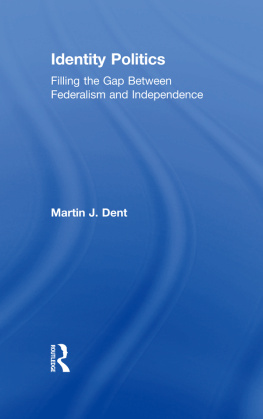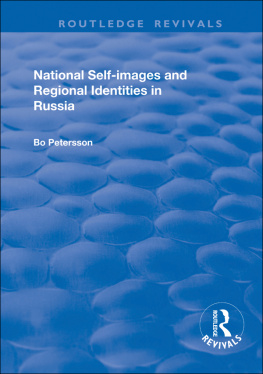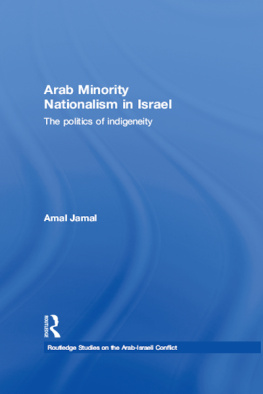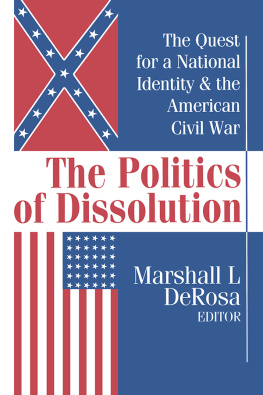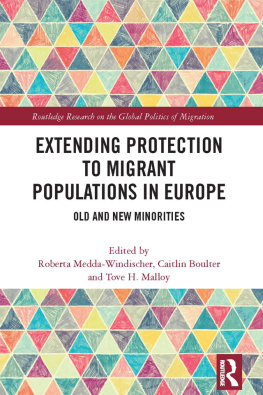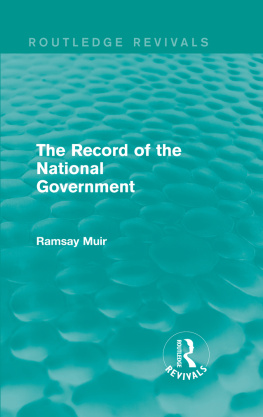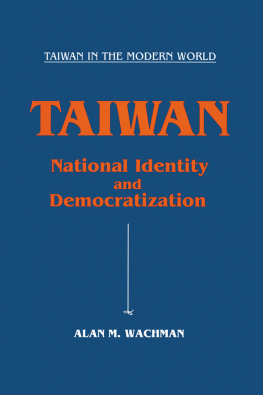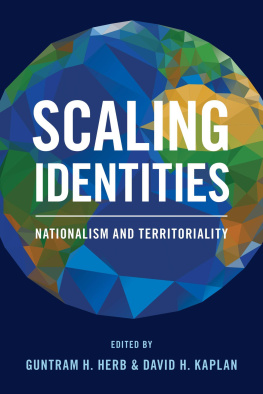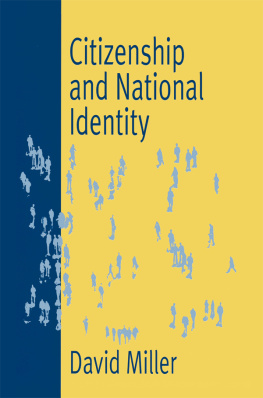IDENTITY POLITICS
Identity Politics
Filling the Gap Between Federalism and Independence
MARTIN J. DENT
Keele University, UK
First published 2004 by Ashgate Publishing
Published 2016 by Routledge
2 Park Square, Milton Park, Abingdon, Oxon OX14 4RN
711 Third Avenue, New York, NY 10017, USA
Routledge is an imprint of the Taylor & Francis Group, an informa business
Copyright 2004 Martin J. Dent
Martin J. Dent has asserted his right under the Copyright, Designs and Patents Act, 1988, to be identified as the author of this work.
All rights reserved. No part of this book may be reprinted or reproduced or utilised in any form or by any electronic, mechanical, or other means, now known or hereafter invented, including photocopying and recording, or in any information storage or retrieval system, without permission in writing from the publishers.
Notice:
Product or corporate names may be trademarks or registered trademarks, and are used only for identification and explanation without intent to infringe.
British Library Cataloguing in Publication Data
Dent, M. J. (Martin J.)
Identity politics : filling the gap between federalism and independence
1. Insurgency Case studies 2. Peace-building 3. Secession
4. Federal government 5. Decentralization in government
I. Title
303.69
Library of Congress Cataloging-in-Publication Data
Dent, M. J. (Martin J.)
Identity politics : filling the gap between federalism and independence / Martin J. Dent
p. cm.
Includes bibliographical references and index.
ISBN 0-7546-3772-7
1. Multiculturalism--Case studies. 2. Culture conflict--Case studies. 3. Nationalism--Case studies. 4. State, The. I. Title.
HM1271.D46 2004
303.6--dc22
2003063687
ISBN 9780754637721 (hbk)
Contents
I approach this book from the standpoint of someone who has been concerned for many years with the business of practical peacemaking. This has involved a great deal of personal involvement in situations of conflict on a more or less local scale. For this activity I was awarded, by the Tiv people in central Nigeria, the Chieftainship title of Asor Tar U Tiv (the one who heals the land of Tiv). This is one of the three or four cases in which expatriates have been awarded Nigerian Chieftainship titles. It is an honour of which I consider myself unworthy and yet cherish with immense gratitude. In practical peacemaking I did not rely on any specific text book but rather proceeded from a very great respect for the value system of the community in which I was working. Again and again, I was conscious of the particular treasured belief of the Tiv people, that they must act as they put it, sha gbaondo I Tiv, that is to say, according to the way that Aondo (God) has created the Tiv people. Action must be taken in accordance with ieren I Tiv (according to Tiv custom). In dealing with strongly held beliefs of a culture different from my own, I am conscious of the doctrine put forward by a sixteenth century European thinker who wrote, all truth is but a shadow of the real truth but the shadow in its own place is true substance. However apparently alien the thought patterns of another people may be, one needs to respect their true substance in their own place. I have attempted to bring a similar sense of respect for various national identities into this work, which is an exercise in peacemaking. It is not designed to examine other peoples theories of the dynamics of the process, for this study is amply and effectively carried out in the various Peace Departments in Bradford and other universities. The object is to fix attention on the common element in the considerable number of conflicts between national minorities, which seek for an unobtainable goal of independent statehood, and the central governments of the countries in which the minorities find themselves, in order to analyse their major patterns and to provide a detailed formula for a means of solving these disputes.
I have also been involved in doing what I can through my writings to assist through suggestions in peacemaking on the many conflicts that cause so much suffering in our world. As I attempt to show in this book, there is a class of such conflicts, where an established national identity, with its own region, seeks to achieve independent statehood but, through the opposition of the larger country of which it forms a part, is unable to win this status. The international community also takes as one of its basic principles the necessary presupposition that the borders of independent states should only be altered with the agreement of the larger political entity, threatened with the secession of one of its parts. In this book I seek to devise a way in which to provide an acceptable substitute for the creation of a separate state by secession. The book is in this sense an original study. There is already a considerable, and worthwhile, body of thought and research on peacemaking in various situations; this work however seeks to be an original contribution, not primarily dependent upon other specific works, but pursuing a logical line of argument to its peacemaking conclusion.
The specific cause for the writing of this book came from my realisation that in the case of the Serbs in Bosnia, they would not get the separate independent state for which they sought, nor be allowed to join the Republic of Serbia, since the international community and almost all the governments of the European Community insisted that there should be no change to the boundaries of the newly recognised independent states in Former Yugoslavia, which corresponded to those of the six federal republics existing before the break up of Yugoslavia. It was equally obvious that the Serb inhabitants of Bosnia, though once part of a single Bosnian entity, had developed so great an enmity for the ruling, largely Muslim, power in Sarajevo that they would not accept any orders from that quarter, nor allow Bosnian soldiers or police to enter the territory which they controlled and had just formally renamed as the Republica Serpska. In this situation it had become clearly necessary to develop a new concept of the common country; one had to extend the study of the devolution of power to a situation where the Republica Serpska could control its own affairs yet would still remain within the larger political entity of Bosnia. In defining such a status and sketching out its basic outline, I soon realised that there were fourteen other instances in the world where a similar division of sovereignty was required. These cases are ones where the dissident minority seeks ardently and continually to have its region excised from the country of which it is a part, and to be recognised itself as an independent sovereign state. This is more than just a revolt for local autonomy, but concerns a contiguous area inhabited to the extent of 70% or more of the population by a minority with its own separate national identity. In all the cases which I have analysed, apart from that of Taiwan, the separate identity can be broadly characterised as a national identity. There is a long and detailed literature on the rise and nature of nationalism; fortunately it is not necessary in this work to review this literature. In brief, one can say that where a group, which constitutes a substantial majority in a particular region, and numbers an appreciable proportion of the population of the larger country of which it forms a part, claims that it has a separate identity and seeks ardently, though generally in vain, for independent statehood, we have to find some other status which will substitute for this goal. Such a status must be seen by the dissident group as an acceptable substitute for independence. Although it will not be totally acceptable to ardent nationalists, it can be at least a valuable partial answer to the dilemma, which causes so much suffering from unnecessary conflicts within states in the world.

